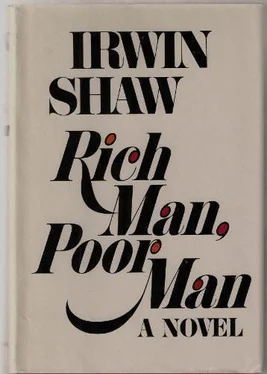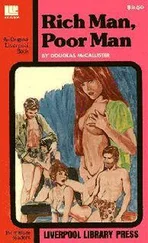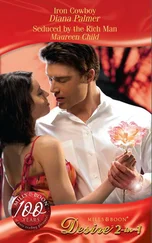He must have gotten up at dawn to drive all the way into town and get into the locked factory before anyone appeared for work.
The classroom was silent except for the busy scratching of pens on paper. Miss Lenaut was seated at her desk reading, occasionally raising her head to scan the room. She had set a half-hour composition for her pupils to write, subject, ‘Franco-American Friendship’. As Rudolph bent to his task at his desk towards the rear end of the room, he had to admit to himself that Miss Lenaut might be beautiful, and undoubtedly French, but that her imagination left something to be desired.
Half a point would be taken off for a mistake in spelling or a misplaced accent, and full point for any errors in grammar. The composition had to be at least three pages long. . Rudolph filled the required three pages quickly. He was the only student in the class who consistently got marks of over 90 on compositions and dictation, and in the last three tests he had scored 100. He was so good in the language that Miss Lenaut had grown suspicious and had asked him if his parents spoke French. ‘Jordache,’ she said. ‘It is not an American name.’ The imputation hurt him. He wanted to be different from the people around him in many respects, but not in his American-ness. His father was German, Rudolph told Miss
Lenaut, but aside from an occasional word in that language, all Rudolph ever heard at home was English.
‘Are you sure your father wasn’t born in the Alsace?’ Miss Lenaut persisted.
‘Cologne,’ Rudolph said and added that his grandfather had come from Alsace-Lorraine.
‘Alors,’ Miss Lenaut said. ‘It is as I suspected.”
It pained Rudolph that Miss Lenaut, that incarnation of feminine beauty and worldly charm and the object of his feverish devotion, might believe, even for a moment, that he would lie to her or take secret advantage of her. He longed to confess his emotion and had fantasies of returning to the high school some years hence, when he was a suave college man, and waiting outside the school for her and addressing her in French, which would by that time be fluent and perfectly accented, and telling her, with an amused chuckle of the shy child he had been, of his schoolboy passion for her in his junior year. Who knew what then might happen? Literature was full of older women and, brilliant young boys, of teachers and precocious pupils. …
He reread his work for errors, scowling at the banality which the subject had imposed upon him. He changed a word or two, put in an accent he had missed, then looked at his watch. Fifteen minutes to go.
‘Hey!’ There was a tortured whisper on his right. ‘What’s the past participle of venir?’
Rudolph turned his head slightly towards his neighbour, Sammy Kessler, a straight D student, Sammy Kessler was bent in a position of agony over his paper, his eyes flicking desperately over at Rudolph. Rudolph glanced towards the front of the room. Miss Lenaut was engrossed in her book. He didn’t like to break the rules in her class, but he couldn’t be known by his contemporaries as a coward or a teacher’s pet
‘Venu,’ he whispered.
‘With two o’s,’ Kessler whispered.
‘A u, idiot,’ Rudolph said.
Sammy Kessler wrote laboriously, sweating, doomed to his D.
Rudolph stared at Miss Lenaut. She was particularly attractive today, he thought. She was wearing long earrings and a brown, shiny dress that wrinkled skin-tight across her girdled hips and showed a generous amount of her stiffly armoured bosom. Her mouth was a bright-red gash of lipstick. She put
lipstick on before every class. Her family ran a small French restaurant in the theatrical district of New York and there was more of Broadway in Miss Lenaut than the Faubourg St Honore, but Rudolph was happily unaware of this, distinction.
Idly, Rudolph began to sketch on a piece of paper. Miss Lenaut’s face took shape under his pen, the easily identifiable two curls that she wore high on her cheeks in front of her ears, the waved, thick hair, with the part in the middle. Rudolph continued drawing. The earrings, the rather thick beefy throat. For a moment, Rudolph hesitated. The territory he was now entering was dangerous. He glanced once more at Miss Lenaut. She was still reading. There were no problems of discipline in Miss Lenaut’s class. She gave out punishments for the slightest infractions with merciless liberality. The full conjugation of the reflexive irregular verb se taire, repeated ten times, was the lightest of her sentences. She could sit and read with only an occasional lifting of her eyes to reassure herself that all was well, that there was no whispering, no passing of papers between desk and desk.
Rudolph gave himself to the delights of erotic art. He continued the line down from Miss Lenaut’s right breast, naked. Then he put in her left breast. He w;as satisfied with the proportions. He drew her standing, three-quarter view, one arm extended, with a piece of chalk in her hand, at the blackboard. Rudolph worked with relish. He was getting better with each opus. The hips were easy. The mons veneris he drew from memory of art books in the library, so it was a bit hazy. The legs, he felt, were satisfactory. He would have liked to draw Miss Lenaut barefooted, but he was bad on feet, so he gave her the high-heeled shoes, with straps above the ankle, that she habitually wore. Since he had her writing on the blackboard, he decided to put some words on the blackboard. Je suis folle d’amour, he printed in an accurate representation of Miss Lenaut’s blackboard script. He started to shade Miss Lenaut’s breasts artistically. He decided that the entire work would be more striking if he drew it as though there were a strong light coming from the left. He shaded the inside of Miss Lenaut’s thigh. He wished there were someone he knew in school he could show the drawing to who would appreciate it. But he couldn’t trust the boys on the track team, who were his best friends, to treat the picture with appropriate sobriety.
He was shading in the straps on the ankles when he became conscious of someone standing beside his desk. He looked up slowly. Miss Lenaut was glaring down at the drawing on his
desk. She must have moved down the aisle like a cat, high heels and all.
Rudolph sat motionless. No gesture seemed worthwhile at the moment. There was fury in Miss Lenaut’s dark, mascaraed eyes and she was biting the lipstick off her lips. She reached out her hand, silently. Rudolph picked up the piece of paper and gave it to her. Miss Lenaut turned on her heel and walked back to her desk, rolling the paper in her hands so that no one could see what was on it.
Just before the bell rang to end class, she called out, ‘Jordache.’
‘Yes, ma’am,’ Rudolph said. He was proud of the ordinary tone he managed to use.
‘May I see you for a moment after class?’ ‘Yes, ma’am,’ he said.
The bell rang. The usual clatter broke out. The students hurried out of the room to rush for their next classes. Rudolph, with great deliberation, put his books into his briefcase. When all the other students had quit the room, he walked up to Miss Lenaut’s desk.
She was seated like a judge. Her tone was icy. ‘Monsieur Vartiste,’ she said. ‘You have neglected an important feature of your chef d’oeuvre.’ She opened the drawer of her desk and took out the sheet of paper with the drawing on it and smoothed it with a rasping noise on the blotter of the desk top. ‘It ,is lacking a signature. Works of art are notoriously more valuable when they are signed authentically by the artist It would be deplorable if there were any doubts as to the origin of a work of such richness.’ She pushed the drawing across the desk towards Rudolph. ‘I will be much indebted to you, Monsieur,’ she said, ‘if you would have the kindness to affix your name. Legibly.’
Читать дальше











